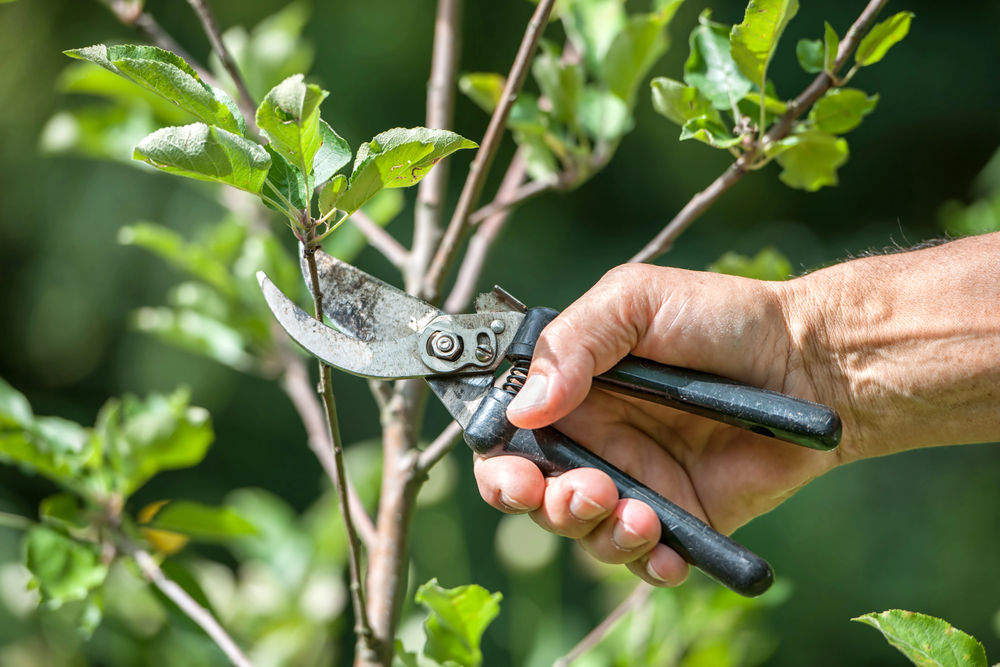As pastors, we are often met with an overwhelming number of ideas, expectations, and activities from our congregation's well-meaning members. They bring their visions of what the church should look like and the roles they think we should fill. While some of these suggestions align with God’s mission, others, though well-intentioned, can lead us down paths that may not be central to Christ’s purpose for the church. The challenge, therefore, is discerning what to embrace and, more importantly, what to prune.
Pruning is not just a gardening concept but a spiritual one that appears in the Bible. Jesus said in John 15:2, “Every branch in Me that does not bear fruit He takes away; and every branch that bears fruit He prunes, that it may bear more fruit.” This is not just a call to cut back but to grow purposefully, ensuring that our efforts are focused on what God truly desires for His church.
What is Spiritual Pruning?
Spiritual pruning refers to the intentional act of removing anything in our lives or ministries that hinders spiritual growth or effectiveness in God’s Kingdom. Just as a gardener cuts away dead or overgrown branches to encourage healthier growth in a plant, spiritual pruning removes distractions, unproductive habits, or activities that no longer contribute to our purpose in Christ. It involves recognizing areas that are either no longer bearing fruit or are consuming energy that should be redirected toward more fruitful endeavours.
This type of pruning is not about punishment but refinement. It’s a divine process where God cuts away the excess, the old, or the unfruitful to bring about new growth and greater spiritual vitality. For pastors, spiritual pruning involves discerning which ministries, programs, or activities no longer align with the church’s mission and vision, allowing us to focus on what truly advances the Kingdom of God.
My Journey with Spiritual Pruning
In my pastoral journey, we once had many significant events that demanded much from our people. Music practices, rehearsals, and event preparation would consume much of our team’s time and energy. While we saw people receive the Holy Spirit at these events, we noticed that many didn’t return. Our team was worn out from all the follow-up, leaving little time to teach Bible studies and make disciples—the very essence of what Christ calls us to do.
We had to take a hard, honest look at our ministry and make tough decisions. After much prayer and reflection, we began to focus on teaching Home Bible Studies, and eventually, we created our curriculum called “Unlocking the Bible.” We put our energy into equipping our people with this curriculum, empowering them to reach out to their friends. We even developed apps to make it easier for people to engage with the material online and offline.
But for this shift to happen, we had to prune back on all the events that weren’t supporting our mission of making disciples. Once we made this change, we began to see a noticeable difference. Our visitors grew in number and became more engaged with the church. Instead of being worn out by large, one-off events, our team could now focus on building lasting relationships and teaching Bible studies, which led to more sustained spiritual growth. As we pruned back events that did not contribute to discipleship, we found that more people stayed and became an integral part of our community.
Stop Comparing Your Church to Others
One of the traps many pastors fall into, myself included, is comparing our churches with those with more resources, manpower, or a larger congregation. While it’s natural to admire the success of others, this comparison can become a source of frustration and insecurity. The truth is that God has called each church to its unique mission, and not every church is meant to operate similarly. Pruning requires that we stop trying to replicate what other churches are doing and instead focus on what God is asking us to do with our resources.
Just because a larger church can host multiple large events, offer more programs, or have a bigger team doesn’t mean we need to strive for the same. We should focus on what God has called our church to do, even if it means scaling back to do it well. When we prune our ministry according to His will, we allow room for the growth best suited for our church’s context.
The Purpose of Spiritual Pruning
The purpose of spiritual pruning is to ensure that every aspect of our lives and ministry is aligned with God’s will and is productive in advancing His Kingdom. There are several key reasons for this process:
1. Increased Fruitfulness
Jesus’ teaching in John 15 emphasizes that pruning leads to more fruit. By cutting away what is no longer productive, we make room for new growth that can flourish. For a church, this might mean stopping certain programs or traditions that, while perhaps meaningful in the past, are no longer bearing fruit in today’s context.
2. Healthier Growth
Pruning allows for healthier, more focused growth. Instead of spreading energy thinly across many activities, a church can concentrate on the areas that produce spiritual maturity and discipleship. It keeps the church vibrant and focused on the core mission of making disciples.
3. Refinement of Purpose
Spiritual pruning clarifies the church’s mission. When we cut back the activities that are no longer in line with Christ’s vision for the church, we refine our purpose and align more closely with God’s calling. It helps us avoid being consumed by “busyness” and instead focus on fulfilling our primary mission.
4. Strengthening the Church Body
By pruning out what is unnecessary, we prevent burnout and fatigue among the saints. Often, churches can become bogged down with activities that drain resources without contributing to spiritual growth. Pruning ensures that the church remains strong, energized, and committed to the right tasks rather than being worn out by non-essential ones.
5. Joyful Service
One of the most beautiful outcomes of spiritual pruning is the emergence of joyful saints. When the church is aligned with God's will and focuses on fruitful activities, it creates an environment where members can serve with gladness. This joy is infectious and can transform the entire community, making ministry a duty and delight. Serving with gladness comes from knowing that one's efforts are making a meaningful impact in advancing God's Kingdom. It reflects a heart that is in tune with God's purpose and filled with His love.
The Courage to Prune
Pruning requires courage. As pastors, it is never easy to let go of something that has been part of the church for years, especially when people are attached to it. However, without the courage to prune, we risk allowing unnecessary activities to drain resources, time, and energy. It takes discernment to recognize which areas of ministry are no longer serving their intended purpose and bravery to make the difficult decision to cut them away.
Moreover, pruning can be met with resistance. Congregants may feel that their ideas or projects are being overlooked or undervalued, leading to tension. But the role of a pastor is not to please everyone; it is to shepherd the flock in the direction that God is leading, even when it means making tough decisions.
Steps to Know What to Prune
1. Seek God’s Direction in Prayer
Before deciding to prune, we must seek the Lord’s wisdom. James 1:5 assures us that if we lack wisdom, we can ask God, who gives generously. Pruning is not just about cutting away what is unnecessary but discerning what God wants to remain. Allowing the Holy Spirit to lead the process ensures that our decisions align with God’s purpose, not human preference.
2. Seek Counsel from Your Spiritual Elders
God often speaks through the wisdom of spiritual elders and mentors. Proverbs 11:14 reminds us, “Where there is no counsel, the people fall; but in the multitude of counsellors there is safety.” Before making major decisions that affect the church, it’s wise to seek the input of seasoned leaders who have walked through similar situations. Their insights can offer clarity, perspective, and affirmation, helping you discern what should be pruned.
3. Evaluate Fruitfulness
Jesus’ metaphor of the vine in John 15 emphasizes bearing fruit. As pastors, we must constantly ask ourselves and our teams, “Is this ministry or activity bearing fruit?” If a program is no longer contributing to spiritual growth, discipleship, or outreach, it may be time to prune. This is not about cutting things arbitrarily but about refocusing on what truly matters.
4. Consider the Timing of Change
Timing is crucial when making changes in ministry. Ecclesiastes 3:1 says, “To everything there is a season, a time for every purpose under heaven.” Even if a ministry or event needs to be pruned, it’s important to seek whether it is the right time for such changes. Implementing change too quickly can cause confusion or instability, while delaying it too long may hinder growth. Seek God’s guidance on the timing, and consult your team to ensure everyone is prepared for the shift.
5. Communicate Clearly
Pruning should never be done in isolation or without explanation. When changes are made, take the time to communicate with your team and congregation why certain activities or ministries are being cut back. Sharing the vision and purpose behind the pruning will help to bring understanding and support, even if there is initial resistance.
6. Empower Growth in Other Areas
Pruning is not just about what you take away but also what you allow to grow. After cutting back, ensure you are channelling resources, time, and energy into areas of ministry that are flourishing. Give your team the support they need to expand in areas that bear the most fruit for the kingdom.
7. Allow Time for Transition and Do it in Phases
Change is never easy, especially when it involves beloved ministries or traditions. Instead of making abrupt changes, consider implementing the pruning in phases. Gradually phasing out certain activities or events allows the church community time to adjust and prevents overwhelming the congregation. This phased approach also gives time to observe and evaluate the impact of each change, making the transition smoother and more manageable. Be patient as people process the changes, and offer guidance and encouragement along the way. Remind them that pruning leads to greater growth and that God is still in control.
8. Remember "Change is Difficult"
Change is never easy. It can feel unsettling, and just like any major surgery, the body needs to be healthy enough to handle the procedure. Suppose we are not spiritually prepared for pruning. In that case, if we’re not seeking God’s guidance, operating in unity, and rooted in a solid foundation—it can become overwhelming and cause more harm than good. Timing, wisdom, and readiness are critical to a healthy transition. We must ask ourselves if our church is spiritually strong and healthy enough to undergo this necessary pruning. Without spiritual health, changes can cause confusion and burnout, but when done correctly, they will lead to a season of fruitful growth.
As pastors, we must continually assess what Christ calls us to focus on and what we need to prune. The church's health is not determined by the number of activities we run but by how effectively we fulfil Christ's mission. Spiritual pruning is not easy, but it is essential for the church to thrive and bear much fruit. Let us have the courage to let go of what no longer serves God’s purpose so we can focus on what will grow His Kingdom.
In doing so, we will not only see the church flourish but also avoid wearing out the saints with unnecessary burdens, allowing them to live out their faith with strength and purpose. By seeking counsel from spiritual elders, we gain the wisdom to make these critical decisions with grace and confidence, knowing that God is guiding the pruning process. Through careful pruning, we make room for more tremendous spiritual growth, more engaged visitors, and a more profound sense of discipleship that will strengthen the entire church body. Most importantly, let us remember to stop comparing ourselves to other churches, trusting that God has a unique plan and purpose for our congregation, and it’s our job to steward what He’s placed in our hands faithfully. Finally, by discerning the right timing for changes and ensuring we are spiritually healthy, we can handle this pruning process like a successful surgery—leading to life, health, and fruitfulness.






Bro. Sam Ponusamy